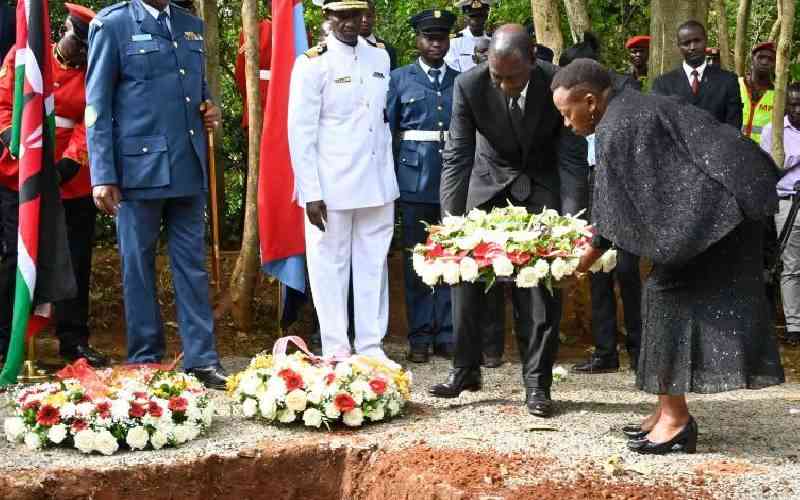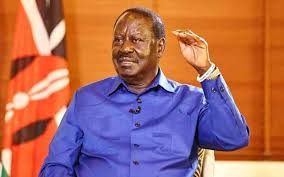 |
|
Kibaki promulgates Kenya's new Constitution.The third anniversary of 2010 Constitution comes amid attacks that could roll back gains. |
By ALPHONCE SHIUNDU
KENYA: Kenya’s much-heralded 2010 Constitution turns three on Monday faced with a multi-pronged assault that could reverse key gains, experts warned on Sunday.
While some of these forays are in the early stages, a proposal that could render a whole chapter of the Constitution redundant by removing senior public of?cials from its purview is at an advanced stage.
The Parliament-backed bill seeks to amend the Constitution to remove the of?ce of Members of Parliament, members of county assemblies, judges and magistrates from the list of designated State of?cers.
Experts have warned that the proposals are an assault on two important principles of the supreme law: Preventing senior public ?gures from determining their own salaries and perks as well as requiring high standards of integrity contained in Chapter Six of the law.
The loudest demand in the latest push to amend the Constitution ratified on August 27 2010 — ending a torturous journey to rewrite the Supreme Law — is the clamour for a referendum on devolution.
A lobby group is also advocating for a review of how the president is elected, a push initially floated by former Premier Raila Odinga but which he hurriedly dropped amid fears it could torpedo the bi-partisan referendum on devolution.
The chairman of the parliamentary committee on Justice and Legal Affairs Samuel Chepkonga published the bill likely to enjoy bi-partisan support in the House.
MPs argue the bill is informed by the need to uphold the doctrine of separation of powers, but critics read an ulterior motive linked to the push for higher salaries.
The Salaries and Remuneration Commission has warned it is an attempt to exclude the groups from perks set by the commission.
SRC has cautioned the wage bill for the three groups will soar by Sh8 billion if they were to determine their salaries.
Roll back gains
The bill is also viewed as an assault on Chapter six of the Constitution on Leadership and Integrity that focuses more on State officers.
“An amendment to exclude persons in leadership positions from being State Officers will preclude them from the application of the chapter,” SRC warned in an advisory opinion on the Bill.
“(It will) render the whole of Chapter Six, which provides for good leadership and integrity, redundant thereby rolling back the gains made in entrenching good governance,” it added.
Stay informed. Subscribe to our newsletter
Dr Ekuru Aukot, who was the secretary of the Committee of Experts that drafted the new Constitution, says those pushing for any constitutional change are motivated by personal and selfish interests.
The chorus to amend the constitution from various quarters is an indicator that what ails the country is lack of leaders with vision and integrity, added Aukot.
Commission on Implementation of the Constitution (CIC) Chairman Charles Nyachae has also termed the call for referendum premature.
Members of the 11th Parliament would be continuing from their predecessors who watered down legislation to implement these constitutional provisions.
Among the last acts of the 10th Parliament was to weaken the Leadership and Integrity Bill, and cripple the Ethics and Anti-Corruption Commission.
Tyranny of numbers
They also worked late into the night rewriting electoral laws to subvert efforts to promote discipline in political parties by approving changes designed to facilitate party hopping. Parliament also approved bills that lowered the academic qualifications for MPs largely blamed for lowering the quality of debate and law making. Currently, the push for a referendum to alter the Constitution to shore up the powers of the Senate and allocate more funds to counties has set the ruling coalition against opposition CORD.
Raila’s CORD has backed down on the push to review presidential elections to address what the coalition terms as “tyranny of numbers” but the drive is alive.
It’s not lost on observers that the March 4 Movement claimed by activist Okiya Omtatah, and which Raila’s former aide, Eliud Owalo, has associated with, is rolling out mass campaigns to popularise a proposal to amend article 138 of the Constitution on presidential elections.
Also Kiharu MP Irungu Kang’ata mulled a motion to push through an amendment to scrap the Senate.
The biggest battle of the new Constitution, for now, is the precedent-setting decision of the Senate to sue the Speaker of the National Assembly and the President in the Supreme Court. All these in just the first five months of President Kenyatta’s government. The case follows the controversial decision of President Kenyatta to side with the National Assembly in locking the Senate out of legislating the Division of Revenue Bill, 2013, which was enacted in June.
Make or break
The case is pending at the Supreme Court. Senate Speaker Ekwee Ethuro says the Supreme Court ruling will make or break the Senate, and by extension the devolution of power and resources to the counties. The mood between the two Houses of Parliament is poisoned. The Speaker of the National Assembly, Mr Justin Muturi, believes his House is superior to the Senate because the Constitution grants the Lower House exclusive legislative jurisdiction unless it is on matters that affect counties.
The Speaker of the Senate, however, says the Constitution is clear that there can be no Parliament without the Senate.
“The Senate has very clear functions set out in the Constitution. What you are seeing is a misinterpretation of the functions of the Senate by our partners (in the National Assembly)—the people who we should work with by right,” said Ethuro said at a Naivasha hotel.
“The question before the Senate is that we need clarity of the Constitution on how we should work when one House seems to behave as if the other House does not exist,” said the Senate Speaker.
Ethuro added: “Before any bill is introduced in either House, we must agree as Speakers of both Houses on how to go about it so that when it is assented to it becomes an Act of Parliament.”
Prior to that, there was another bill to amend the Constitution to determine the election date, and get a formula on how the two-thirds gender threshold could be sidestepped.
MPs have also maintained a stranglehold on the Constituency Development Fund despite protests it is unconstitutional for them to continue controlling the fund. Parliament mutilated the Act to give MPs sway over implementation of the Sh22 billion kitty.
The move is contrary to the Constitutional principle of devolution and that on separation of powers. Critics argue the work of MPs is legislation, oversight and representation.
The implementation of projects in the constituencies is the preserve of the County governments. “We really think these matters will be resolved and that this period of insanity will not last forever,” said Ethuro while he stood in the same room where the Parliamentary Select Committee on Constitution Review put final touches on the Chapter on devolution.
 The Standard Group Plc is a
multi-media organization with investments in media platforms spanning newspaper
print operations, television, radio broadcasting, digital and online services. The
Standard Group is recognized as a leading multi-media house in Kenya with a key
influence in matters of national and international interest.
The Standard Group Plc is a
multi-media organization with investments in media platforms spanning newspaper
print operations, television, radio broadcasting, digital and online services. The
Standard Group is recognized as a leading multi-media house in Kenya with a key
influence in matters of national and international interest.
 The Standard Group Plc is a
multi-media organization with investments in media platforms spanning newspaper
print operations, television, radio broadcasting, digital and online services. The
Standard Group is recognized as a leading multi-media house in Kenya with a key
influence in matters of national and international interest.
The Standard Group Plc is a
multi-media organization with investments in media platforms spanning newspaper
print operations, television, radio broadcasting, digital and online services. The
Standard Group is recognized as a leading multi-media house in Kenya with a key
influence in matters of national and international interest.









